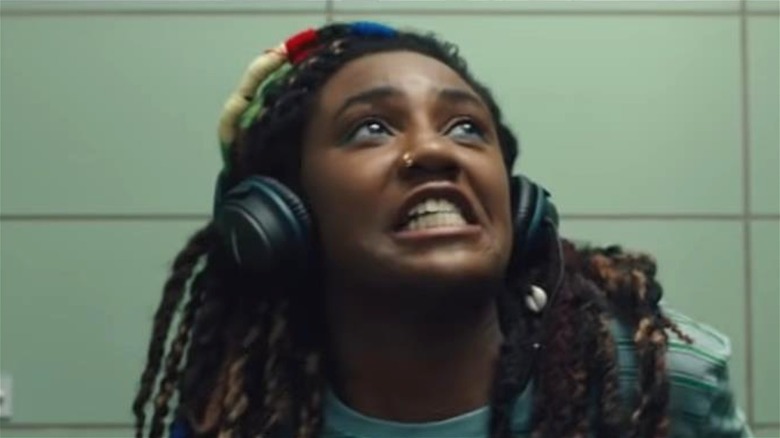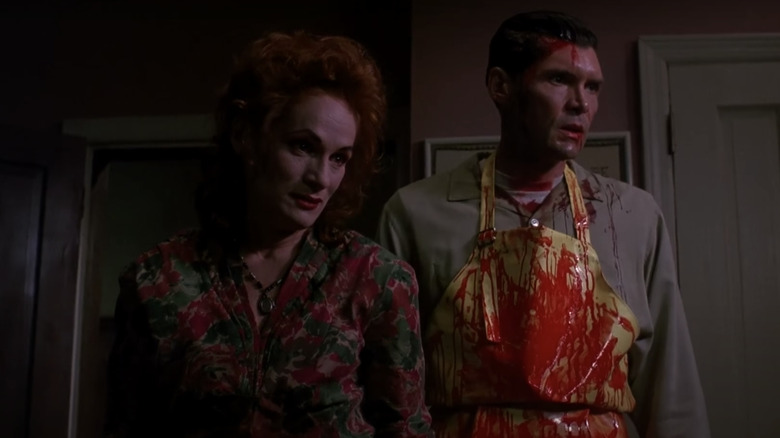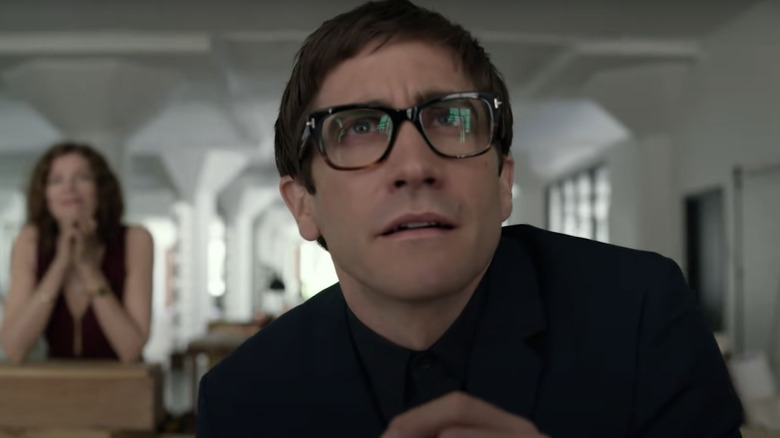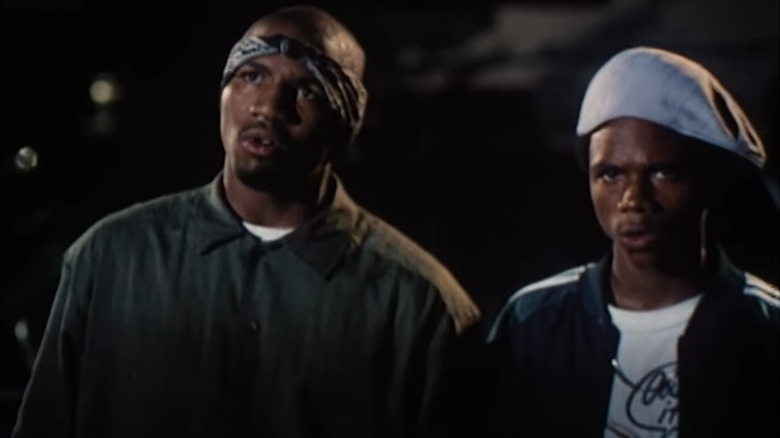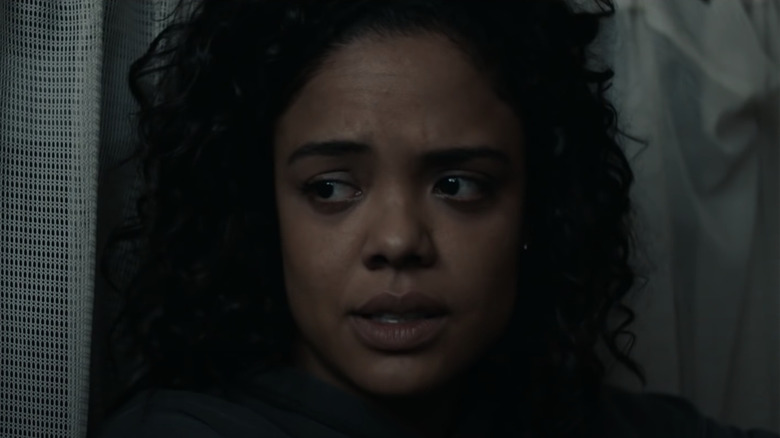The Movies To Watch If You Loved The Newest Candyman Movie
Nia DaCosta's "Candyman" brought its titular, 1990s screen boogeyman into the 21st century. The film impressively managed to underscore the racial tensions of the original — exploring issues of generational trauma and gentrifications — all while still being genuinely scary.
DaCosta's "Candyman" stars Yahya Abdul-Mateen II as an artist named Anthony McCoy, whose artwork begins to center around the old Candyman urban legends of the now-demolished Cabrini Green projects. The movie also interrogates the way the 1992 version centered white protagonist Helen Lyle (Virginia Madsen), with one of the new film's characters remarking that "one white woman dies and the story lives forever."
If you liked 2021's "Candyman," then that means you are a fan of Black stories being told by Black creators. It also probably means you're in for scares, you think urban legends and folklore are fascinating, and maybe you even want to see the contemporary art world get taken down a peg. Fortunately, there are plenty of movies that meet some of those requirements, and we have gathered just a few of them for you below.
The People Under the Stairs is an insane horror-thriller
Wes Craven's "The People Under the Stairs" has the energy and mood of an urban legend. The film stars Brandon Adams as Poindexter "Fool" Williams, and follows him as he and his family find themselves being evicted from their home by their landlords, the Robesons. Seeking revenge for the eviction, Fool and his friends break into the Robesons' house only to find out that his landlords are eviler than any tenant's association would have you believe.
Indeed, the film reveals that Mommy and Daddy Robeson (played by "Twin Peaks" stars Wendie Robie and Everett McGill) have kidnapped a number of children and deprived them of food to the point where they've resorted to cannibalism. Like "Candyman," "The People Under the Stairs" heightens the real-world horrors of gentrification and displacement, and the Robesons represent how society often figuratively cannibalizes Black and brown neighborhoods.
That spooky house at the end of the block? Yeah, it turns out the people who live there are incestuous cannibals.
Velvet Buzzsaw also satirizes the art world
Jake Gyllenhaal leads the ensemble cast of "Velvet Buzzsaw," a Netflix original horror movie about cursed contemporary art. It follows Josephina (Zawe Ashton), who discovers the art of a dead man named Vetril Dease and shares the pieces with her boss (Rene Russo) and bisexual art critic boyfriend (Gyllenhaal), both of whom are transfixed by the work. The trio goes on to show the art to great success, until, of course, the art starts killing people.
"Velvet Buzzsaw" satirizes the lengths to which artists and art dealers will go to achieve success in the greedy world of contemporary art. The film notes that conceptual art often doesn't have intrinsic value, which means its worth is determined by the opinions of tastemakers and, more importantly, by how much people are willing to spend on it. As a result, "Velvet Buzzsaw" sheds a light on how mercenary such a world can be.
In addition to Gyllenhaal, Ashton, and Russo, "Velvet Buzzsaw" also stars Toni Colette, Natalia Dyer, John Malkovich, and "Hamilton" star Daveed Diggs.
Tales from the Hood is dark and funny
Horror anthology films are always fun, and "Tales from the Hood" uses the format exceptionally well. Executive produced by Spike Lee, the vignettes in "Tales from the Hood" focus on Black American issues such as gang violence, police brutality, abuse, and the legacy of slavery. The film uses its unique framing device to focus on three gangbangers as they meet up with an undertaker at a funeral home to buy drugs off him. However, as they make their way through the funeral home, they come across bodies whose stories the undertaker shares.
"Tales from the Hood" was directed and co-written by Rusty Cundieff, who got his big break on "Days of Our Lives." It features performances from David Alan Grier ("Jumanji"), Corbin Bernsen ("Psych"), Clarence Williams III (the original "Mod Squad"), Paula Jai Parker ("Friday"), Roger Guenveur Smith ("Oz"), and Rosalind Cash ("The Omega Man"). Today, the film remains just as inventive and unique as it was when it was first released back in 1995.
Little Woods is Nia DaCosta's first feature film
If you like Nia DaCosta's work on "Candyman," you should check out her directorial debut.
"Little Woods" stars Tessa Thompson ("Thor: Ragnarok") and Lily James ("Cinderella") as two sisters whose lives have taken different paths. After their mother's death, Ollie (Thompson) and Deb (James) became estranged, with the former ending up on probation for illegally crossing the border between North Dakota and Canada. With eight days left on Ollie's probation, Deb comes back home asking for help, revealing that she is pregnant and living in an illegally parked trailer. Ollie must subsequently figure out how to provide for her sister without succumbing to homelessness herself.
Critics were wowed by "Little Woods," comparing it favorably to "Winter's Bone," the movie that launched Jennifer Lawrence to stardom. Like "Candyman," "Little Woods" grounds its emotional arc in a current American issue (in this case, the ongoing opioid crisis). The film holds a 95% fresh rating on Rotten Tomatoes, with NPR calling it an "intimate realist [drama] with a touch of the Grimm fairytale, made by women about women struggling to rise above lives hemmed in by danger and deprivation."
